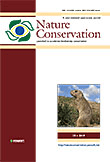
Nature Conservation-Bulgaria
Scope & Guideline
Innovating conservation strategies through impactful scholarship.
Introduction
Aims and Scopes
- Biodiversity Assessment and Conservation Strategies:
The journal publishes studies that assess biodiversity across different ecosystems, emphasizing the development of conservation strategies to protect endangered species and habitats. - Ecological Research and Environmental Impact:
Research articles often explore ecological interactions, the impacts of human activities on the environment, and the effectiveness of conservation measures. - Landscape and Habitat Management:
The journal includes research on landscape ecology, habitat management, and restoration practices aimed at enhancing biodiversity and ecosystem services. - Conservation Policy and Socio-Economic Factors:
Papers frequently address the socio-economic dimensions of conservation, including policy implications, community engagement, and the role of stakeholders in conservation efforts. - Technological Innovations in Conservation:
The journal highlights the use of innovative technologies, such as remote sensing and genetic analysis, to inform conservation practices and monitor ecosystem health.
Trending and Emerging
- Climate Change and Its Impact on Biodiversity:
There is a growing focus on the effects of climate change on ecosystems and species, with researchers exploring how shifting climates alter habitat suitability and biodiversity patterns. - Interdisciplinary Approaches to Conservation:
An increasing number of studies incorporate interdisciplinary methods, blending ecological research with social sciences, economics, and technology to address complex conservation issues. - Community-Based Conservation Initiatives:
Papers are increasingly highlighting the importance of local community involvement and traditional knowledge in conservation efforts, recognizing the role of stakeholders in successful biodiversity management. - Restoration Ecology and Adaptive Management:
Research on ecological restoration practices and adaptive management strategies is trending, reflecting a need for practical solutions to restore degraded ecosystems and enhance resilience. - Impact of Anthropogenic Factors on Wildlife:
There is an emerging emphasis on understanding the impact of human activities, such as urbanization and pollution, on wildlife populations and habitats, which is critical for developing effective conservation strategies.
Declining or Waning
- Traditional Species-Specific Studies:
There has been a noticeable decrease in papers focused solely on individual species assessments, as the journal increasingly emphasizes broader ecological and systemic approaches to conservation. - General Environmental Education:
Research that primarily addresses environmental education without a strong connection to practical conservation outcomes appears to be less frequent, indicating a shift towards more actionable and data-driven studies. - Descriptive Studies without Conservation Implications:
Papers that provide descriptive accounts of biodiversity without linking findings to conservation actions or policy implications are becoming less common, as the journal seeks to enhance the impact of its research.
Similar Journals
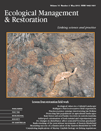
ECOLOGICAL MANAGEMENT & RESTORATION
Championing biodiversity and ecosystem resilience.Ecological Management & Restoration is a premier international journal published by Wiley, dedicated to advancing the fields of ecology, environmental management, conservation, and restoration practices. With an impact factor that positions it in the Q2 category across various ecological and management domains, this journal serves as a critical platform for researchers and professionals seeking to address contemporary issues related to ecosystem health, biodiversity, and sustainable management. Covering a wide range of topics from ecological restoration techniques to policy impacts on nature conservation, the journal caters to a diverse audience and contributes to the scientific community's understanding of environmental challenges. Importantly, the journal provides significant visibility, ranking in the top percentiles within key ecological research arenas such as Nature and Landscape Conservation, reinforcing its value for researchers aiming to influence both scientific thought and practical applications in ecology and management. The journal's commitment to disseminating high-quality research makes it an essential resource for students, researchers, and practitioners dedicated to fostering a sustainable future.
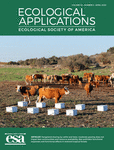
ECOLOGICAL APPLICATIONS
Exploring the intersection of ecology and application.ECOLOGICAL APPLICATIONS, published by WILEY, is a leading journal in the field of ecology, providing a platform for innovative research that addresses the understanding and management of ecological systems. With an ISSN of 1051-0761 and E-ISSN of 1939-5582, it has established itself as a vital resource for ecologists and environmental scientists since its inception in 1991. Ranked in the top quartile (Q1) for Ecology in 2023 and with a Scopus ranking of 40 out of 461 in Environmental Science, ECOLOGICAL APPLICATIONS boasts an impressive impact factor, attesting to its significance and influence in the field. The journal's mission is to publish peer-reviewed articles that contribute to ecological theory and its applications in conservation and environmental management. Researchers, professionals, and students alike will find invaluable insights and the latest developments in ecological research through its comprehensive scope and rigorous scholarship, ensuring a crucial role in shaping future ecological practices and policies.

Ecosistemas
Empowering ecological research for a thriving planet.Ecosistemas is a prominent Open Access journal published by the ASOCIACION ESPANOLA ECOLOGIA TERRESTRE, specializing in the field of ecology. Since its inception in 2001, it has dedicated itself to advancing ecological knowledge and research, fostering an inclusive platform for the dissemination of cutting-edge studies that span ecological interactions, sustainability, and biodiversity. The journal, based in Spain, has established its reputation with notable rankings such as Q3 in the field of Ecology and Q4 in Ecology, Evolution, Behavior, and Systematics, reflecting its commitment to quality research. With a Scopus Ranks position placing it in the 40th and 37th percentiles for its categories, Ecosistemas is integral to the academic community, serving researchers, professionals, and students alike. It provides a vital resource for those seeking to understand ecological dynamics and environmental challenges, facilitating open access to important findings and discussions that shape the future of our ecosystems.
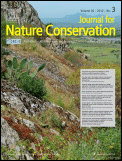
JOURNAL FOR NATURE CONSERVATION
Pioneering Solutions for Environmental ChallengesJOURNAL FOR NATURE CONSERVATION, published by Elsevier GmbH, serves as a pivotal platform for the dissemination of applied and theoretical research in the fields of ecology, nature, and landscape conservation. With an ISSN of 1617-1381 and an E-ISSN of 1618-1093, this esteemed journal has earned a notable reputation, ranking in the Q2 category for both Ecology and Nature and Landscape Conservation in 2023. It is indexed in Scopus with commendable rankings, including #67/211 in Environmental Science - Nature and Landscape Conservation, highlighting its significance within the academic community. The journal’s diverse scope captures the complexities of environmental challenges and offers insights beneficial to researchers, conservationists, and policymakers dedicated to preserving biodiversity and facilitating sustainable practices. Situated in Munich, Germany, the journal has continuously contributed valuable knowledge since its inception in 1991, making it an essential resource for those committed to advancing conservation efforts on a global scale.

Journal of Wildlife and Biodiversity
Unveiling the secrets of nature's diversity.Journal of Wildlife and Biodiversity, published by Arak University in Iran, is an Open Access journal that has been contributing to the fields of wildlife science and biodiversity since its inception in 2017. With an E-ISSN of 2588-3526, this journal serves as a vital platform for researchers, professionals, and students alike, dedicated to disseminating significant findings related to animal sciences, ecology, and environmental conservation. Despite its current Q4 ranking in various categories (Animal Science, Ecology, and Nature and Landscape Conservation) according to the 2023 metrics, the journal's commitment to advancing knowledge in wildlife and biodiversity remains unwavering. Although the journal's Scopus coverage has been discontinued since 2024, it continues to cater to a wide audience by promoting innovative research and fostering collaborations in the academic community, ultimately aiming to enhance understanding and conservation strategies for wildlife and their habitats.
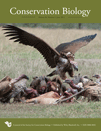
CONSERVATION BIOLOGY
Bridging research and action for biodiversity protection.CONSERVATION BIOLOGY, published by Wiley, is a leading journal in the field of ecology and conservation, with a focus on disseminating high-quality research that addresses pressing environmental challenges. With a strong impact factor and categorized in the top quartile (Q1) across various relevant fields including Ecology, Evolution, Behavior and Systematics, and Nature and Landscape Conservation, the journal plays a pivotal role in advancing the scientific understanding of biodiversity and conservation practices. Since its establishment in 1987, CONSERVATION BIOLOGY has provided a vital platform for researchers, professionals, and students to share innovative findings and facilitate discussions surrounding ecological sustainability and conservation strategies. Although it is not an open-access publication, it ensures that a wide range of significant research is accessible to the global scientific community. The journal’s rigorous peer-review process and reputation for excellence make it an essential resource for anyone involved in the study of ecology and conservation.
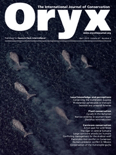
ORYX
Exploring the Nexus of Nature and ScienceORYX, published by Cambridge University Press, stands as a prestigious scholarly journal in the fields of Ecology, Evolution, and Conservation. With an ISSN of 0030-6053 and E-ISSN 1365-3008, this journal has been a critical platform for researchers and professionals since its inception in 1950. Recognized for its excellence, ORYX ranks in the Q1 quartile for both Ecology, Evolution, Behavior and Systematics and Nature and Landscape Conservation as of 2023, highlighting its influential contributions to the field. With a strong focus on disseminating innovative research and fostering collaboration among scientists, the journal covers a broad array of topics, from biodiversity and ecosystem services to conservation strategies and policy implications. As a result, ORYX provides invaluable insights that help shape the future of environmental science. Its impressive Scopus rankings place it in the top 80th percentile in its categories, further underscoring its importance and appeal among academics, professionals, and students alike.

Tropical Life Sciences Research
Unveiling Innovations in Tropical Life SciencesTropical Life Sciences Research, published by PENERBIT UNIVERSITI SAINS MALAYSIA, is an esteemed open-access journal dedicated to the realms of Agricultural and Biological Sciences, Biochemistry, Genetics, and Molecular Biology, and Medicine. Since its inception in 2006, this journal has established itself as a significant platform for disseminating high-quality research findings that contribute to the understanding of tropical biodiversity and health-related issues. With its innovative approach, Tropical Life Sciences Research has garnered an impressive impact factor, reflecting its influence in the academic community; it is ranked Q2 in Agricultural and Biological Sciences and Q3 in both Biochemistry and Medicine categories as of 2023. Researchers and professionals can access a wealth of knowledge through this journal, whose content spans from 2009 to 2024, making it a vital resource for students and experts alike interested in advancing the science of tropical ecosystems and health. The journal also stands out for its comprehensive Scopus rankings, indicating its relevance and quality in the competitive academic landscape.

Frontiers in Conservation Science
Empowering Research to Protect Our Natural HeritageFrontiers in Conservation Science, published by Frontiers Media SA in Switzerland, is an esteemed open-access journal dedicated to advancing research in the field of conservation science. With an E-ISSN of 2673-611X, this journal aims to facilitate the exchange of knowledge among researchers, professionals, and students by publishing high-quality, peer-reviewed articles that explore innovative solutions to contemporary conservation challenges. Since its establishment in 2020, the journal has rapidly ascended to a Q2 ranking in the Nature and Landscape Conservation category, reflecting its commitment to impactful scholarship, as evidenced by its Scopus rank of #93 out of 211 in Environmental Science and a 56th percentile ranking. By promoting open access, Frontiers in Conservation Science ensures that vital research is widely disseminated, fostering collaboration and informed decision-making in the conservation community. This journal is a crucial platform for those dedicated to understanding and preserving our planet's biodiversity and landscapes.

Neotropical Biology and Conservation
Exploring the Rich Tapestry of Neotropical LifeNeotropical Biology and Conservation, published by Pensoft Publishers, serves as a pivotal platform for researchers and professionals dedicated to the understanding and preservation of biodiversity in the Neotropical region. This Open Access journal, operational since 2006 and based in Brazil, invites contributions that delve into the complexities of ecology, evolution, and conservation strategies pertinent to the diverse ecosystems of South and Central America. With a commendable 2023 impact factor reflected in its Q3 rankings across multiple categories including Animal Science, Ecology, and Plant Science, it stands as a valuable resource for academics seeking to publish innovative findings and foster dialogue in these critical areas of study. The journal's commitment to open access ensures that knowledge is readily available to anyone interested in advancing the field of neotropical biology and conservation. Join the global conversation and contribute to the vital work of preserving our planet’s rich biological heritage through rigorous research published in this esteemed journal.